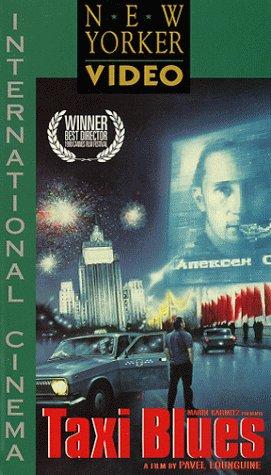
| None | Light | Moderate | Heavy | |
|---|---|---|---|---|
| Language | ||||
| Violence | ||||
| Sex | ||||
| Nudity |
Content:
(LLL, VV, SSS, N, A, M) At least 30 obscenities; moderate violence; graphic sexual immorality and partial female/male nudity; and, alcohol abuse, drunkenness and theft.
More Detail:
This Soviet film, although ostensibly about a love/hate relationship between a drunken, Jewish saxaphone player, Lyosha, and a sybaritic, hard-nosed Moscow taxi driver, Ivan Schlikov, turns out to be a not-so-subtle exploration of the Russian psyche.
The film opens in night-time Moscow amid a celebration complete with spectacular fireworks. Appropriately, this gay, light-filled scene contrasts accurately with the dark portrayal of Russian glibness. Thus, the film juxtaposes not only the exterior with the interior, but also the personalities of Lyosha and Ivan.
After a night of carousing, Lyosha (the good guy), who proclaims himself a “genius” and claims to talk to God, sneaks off without paying the 70-ruble bill on the meter. Later, the cabbie, Schlikov, (the bad guy) tracks the musician down and takes his sax in exchange for payment. However, when Schlikov discovers how expensive the musical instrument is, he decides not to sell it on the black market, for a man in debt can be useful in other ways. (Proverbs 22:7 states it this way: “The rich rule over the poor, and the borrower is servant to the lender.”)
Thus, the down-and-out musician bunks in Schlikov’s rundown apartment while performing menial duties to earn his keep, like cleaning and polishing Schlikov’s cab. Lyosha is even hired out to clean other cabs and provides the music for a dinner with Schlikov’s girlfriend, which ends in a drunken orgy. This scene establishes a recurring party theme that runs through the film and also reveals Schlikov’s growing bewilderment concerning Lyosha: is he a gifted saxophonist, or a pathetic, down-on-his luck drunk?
A constant game of one-upmanship ensues until one day a musician chum brings Lyosha to a recording studio for a tryout. An American sax player (played by Hal Singer) who is on tour happens to be there, and the two hit it off while improvising a blues theme. Signed for an American tour, Lyosha acquires fame overnight, and his tour is aired on Soviet TV to the astonishment of Schlikov. When Lyosha returns, it is Schlikov the cab driver who now finds himself relegated to the underling position.
In addition to being a provocative character study, TAXI BLUES depicts the depressing, almost surrealistic landscape of modern-day Russia. Moscow looks as though it has been hit by cluster bombs, with its huge potholes in the pavement and courtyards containing piles of debris. Inside the buildings, the wallpaper is peeling and the plaster is crumbling.
Sadly, these outward conditions are reflected in the peoples’ lives. They seem vacuous and superficial with no reason to live. On the one hand, they behave like animals, having sex any time, any place: on the other, they are devoid and seemingly unquestioning about spiritual values that could remedy their obviously deep unhappiness.
While TAXI BLUES is not recommended, the film does provide valuable insight into Russian spiritual needs, reminding us of Romans 10:14: “How, then, can they call on the one in they have not believed in? And how can they believe in the one of whom they have not heard? And how can they hear without someone preaching to them?”
The film opens in night-time Moscow amid a celebration complete with spectacular fireworks. Appropriately, this gay, light-filled scene contrasts accurately with the dark portrayal of Russian glibness. Thus, the film juxtaposes not only the exterior with the interior, but also the personalities of Lyosha and Ivan.
After a night of carousing, Lyosha (the good guy), who proclaims himself a “genius” and claims to talk to God, sneaks off without paying the 70-ruble bill on the meter. Later, the cabbie, Schlikov, (the bad guy) tracks the musician down and takes his sax in exchange for payment. However, when Schlikov discovers how expensive the musical instrument is, he decides not to sell it on the black market, for a man in debt can be useful in other ways. (Proverbs 22:7 states it this way: “The rich rule over the poor, and the borrower is servant to the lender.”)
Thus, the down-and-out musician bunks in Schlikov’s rundown apartment while performing menial duties to earn his keep, like cleaning and polishing Schlikov’s cab. Lyosha is even hired out to clean other cabs and provides the music for a dinner with Schlikov’s girlfriend, which ends in a drunken orgy. This scene establishes a recurring party theme that runs through the film and also reveals Schlikov’s growing bewilderment concerning Lyosha: is he a gifted saxophonist, or a pathetic, down-on-his luck drunk?
A constant game of one-upmanship ensues until one day a musician chum brings Lyosha to a recording studio for a tryout. An American sax player (played by Hal Singer) who is on tour happens to be there, and the two hit it off while improvising a blues theme. Signed for an American tour, Lyosha acquires fame overnight, and his tour is aired on Soviet TV to the astonishment of Schlikov. When Lyosha returns, it is Schlikov the cab driver who now finds himself relegated to the underling position.
In addition to being a provocative character study, TAXI BLUES depicts the depressing, almost surrealistic landscape of modern-day Russia. Moscow looks as though it has been hit by cluster bombs, with its huge potholes in the pavement and courtyards containing piles of debris. Inside the buildings, the wallpaper is peeling and the plaster is crumbling.
Sadly, these outward conditions are reflected in the peoples’ lives. They seem vacuous and superficial with no reason to live. On the one hand, they behave like animals, having sex any time, any place: on the other, they are devoid and seemingly unquestioning about spiritual values that could remedy their obviously deep unhappiness.
While TAXI BLUES is not recommended, the film does provide valuable insight into Russian spiritual needs, reminding us of Romans 10:14: “How, then, can they call on the one in they have not believed in? And how can they believe in the one of whom they have not heard? And how can they hear without someone preaching to them?”


 - Content:
- Content: 

